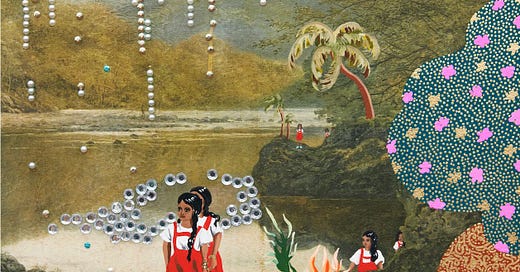
I’m reading Robert Harris’s novel, Conclave, which is terrific so far (and will catch the film when I return to the States). Halfway through, Cardinal Lawrence notes that “Certainty is the great enemy of unity. Certainty is the deadly enemy of tolerance.”
Perspicacious lines and ominously prescient ones, too.
In the nine years since Harris’s novel was published our culture has, if anything, become more enamored with certainty, not less — which is really saying something. Ours is a culture, a society, that seems fantastically certain of certainty. Certainty rules our political discourse, an our-side-is-right-the-other-side-wrong absolutism that the internet helps to empower. As Warzel and Caulfield lamented in The Atlantic recently, ours is a culture “where every event — every human success or tragedy — becomes little more than evidence to score political points...It is a culture where you never have to change your mind or even confront uncomfortable information.”
You don’t need to be Wittgenstein to recognize that certainty as a habit of the mind, as an epistemological reflex, ain’t been doing us any favors — not at the level of the individual or the society. Certainty is a state of final judgment — one might even say terminal judgment. Certainty is the opposite of curiosity and open-ness, and about the worst form of knowing there is because it brooks no discussion, no amelioration, no correction, no testing.
Perhaps you've heard the "lizard people theory" that is rampant among the QAnon crowd — that shit is both a product of untrammeled certainty and its perfect avatar because there’s nothing more inhumanly reptilian than certainty. Certainty, after all, is not only intolerant of honest debate — it is intolerant of that human essential: intersubjectivity.
Any surprise that certainty is the one form of knowing that our political elites most encourage and model?
It probably goes without saying that certainty is also the great enemy of art, and the deadly enemy of the artist.
I suspect the artists that will speak to our moment (and survive it ) best will be ones with the lowest levels of certainty, who haven’t allowed the lure of social media to turn them into certainty pimps, who recall Milan Kundera’s observation that the novelist/artist teaches us to comprehend the world as a question, not an answer. As Kundera notes, “There is wisdom and tolerance in that attitude.” The artists who I’m most interested in these days are the ones who struggle always to be “heard over the noisy foolishness of human certainties.”
In that spirit, my resolution for 2025 is to indulge in way less certainty — less knowing. Not only at the higher cognitive level, but in smaller habitual ways. To resist the political temptation of our conjuncture, its coziness with certainty. To resist the urge to turn to my phone for an immediate answer every time I have a question or an inquietud — to dwell more often and fully in a state of unknowing.
Unknowing, after all, is a form of knowing, one that is humble, vulnerable, and curious. As Patricia L. Munhall observed, “Unknowing is a condition of openness” and also profoundly human — “in the intersubjective space of two people or people of two cultures (unknowing) allows others to be.”1
I’m not surprised that in a time of hideous precarity so many of us would find ourselves tempted by the false grandiosities of certainty. But we must not confuse certainty with safety — in fact, certainty is the end of the imagination and therefore the definition of unsafety. Nor should we confuse unknowing with ignorance. To unknow is to admit limits, to acknowledge that others might have answers you lack, to recognize our exquisite interdependence as people, and best of all to seek within. To dwell in unknowing is to put your phone away and be for a brief moment completely, imperfectly, human.
In times like ours unknowing is excellent proof against our society’s inhumanity, against the lizard supremacy of certainty.
There is wisdom in the question deferred, the question without an immediate answer. Tolerance and unity, too.
And art, as well, if we can tolerate the fact that we are all forever a question without answers, a beautiful unknown, an infinite unknowing.
'Unknowing': Toward Another Pattern of Knowing in Nursing, Patricia L. Munhall, Nursing Outlook 1993:41:125-8.




All I know is that I know nothing at all
A former mentor of mine used to say that awareness of the unknown is more important than what we think we know. Thank you for this.